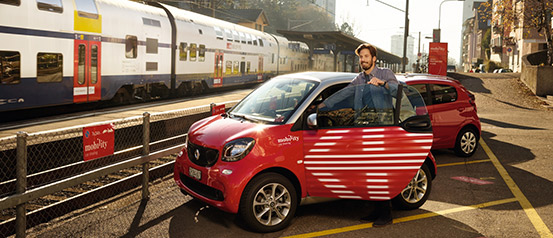by Conrad Wagner and Richard Katzev
Car sharing is becoming popular in Europe, especially in Switzerland and Germany. In Switzerland a car sharing company, Auto Teilet Genossenschaft (ATG), already has more than 6,000 members, while a similar organization in Germany, Stattauto Berlin, has more than 4,000 members.
Although car sharing has in principle operated among friends and family members since the onset of the automobile, the first formal car sharing organizations began in the late 1980s in Europe. For example, in the small Berlin neighborhood of Kreuzberg an economics student Markus Peterson, his brother Carsten, and a few friends came together in 1988 to share the expense and responsibilities of car ownership with each other. After a slow start Stattauto (Instead of Cars) incorporated in 1990, and at least one new member has joined daily since December of that year.
The car sharing movement has also expanded rapidly in Switzerland, which is primarily served by ATG, Europe’s largest provider. ATG was founded in 1987 and opened its first three branches in and around Lucerne. Its membership has grown steadily, and includes a growing number of businesses that have found car sharing to be an attractive mobility option. ATG users are currently co-owners of 300 cars, caravans, vans and pick-up trucks spread over 150 locations throughout Switzerland.
If you belong to ATG, you simply phone a 24-hour hotline to reserve a car. The vehicle can be picked up at one of the decentralized locations throughout the city. About 90 percent of car bookings can be made at the closest site. At each location a safe containing keys can be accessed with your own special key and computerized card. After your trip you fill out a log-book with the distance and duration of your journey. At the end of each month, you receive a bill based on the mileage and time entries for that period. All maintenance, service, repairs and insurance arrangements are handled by ATG. Your only obligation is to fill the tank when you have completed your journey, using an ATG gascard.
ATG users pay an annual membership fee of 1000 Swiss francs (about $850) and a one-time fee of 200 francs ($170) to join the organization. After that, you only pay for what you drive: 50 centimes (40 cents) per kilometer, and 40 centimes (35 cents) plus 2.35 francs ($2) per hour for distances of 100 km or more. Night hours are free. Gas and insurance are included in the prices listed above.
Using a shared car is less expensive for many Europeans than driving a privately owned car. Average annual mobility expenses for ATG users have been reduced by 2,500 francs ($2,000). Generally speaking, car sharing is an advantage for those who do not drive more than 12,000 kilometers (7,400 miles) per year.
Car sharing can help save energy, reduce emissions and lessen traffic congestion. Switzerland’s Department of Energy and Germany’s Department of Transportation have investigated the effects of Auto Teilet membership on mobility habits and energy usage. Although they previously drove 10,000-15,000 kilometers per year as auto owners, ATG users traveled only 5,000 kms per year in shared cars and used public transport for their other transportation needs.
Despite the popularity of single occupancy vehicle travel, there has never been a better time to initiate a car sharing organization like ATG in the U.S. At present there are only two car share organizations in North America. Both are in Canada, where AutoCom in Quebec City and CommunAuto in Montreal have become quite successful. The Quebec car sharing organization now has 170 members and 18 cars, while there are 40 members and 6 cars in the Montreal group.
Several other recent attempts to initiate car sharing programs have not fared so well. Garden City Car Share in Victoria, British Columbia attempted to establish a car sharing program in 1995, but folded soon thereafter for lack of financial support. Short-Term Auto Rental (STAR), established in San Francisco in 1985, was the most ambitious car sharing organization in the United States. At one point there were more than 240 participating households and 53 cars in STAR. Unfortunately, as a result of unprofitable operations and poor management, STAR folded after 18 months of what had been planned as a three year project.
Cooperative Auto Network in Vancouver, British Columbia has launched a pilot project with plans for a full-fledged startup organization this fall. Car sharing projects are also on the drawing boards in both Portland and Eugene, Oregon.







